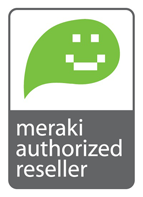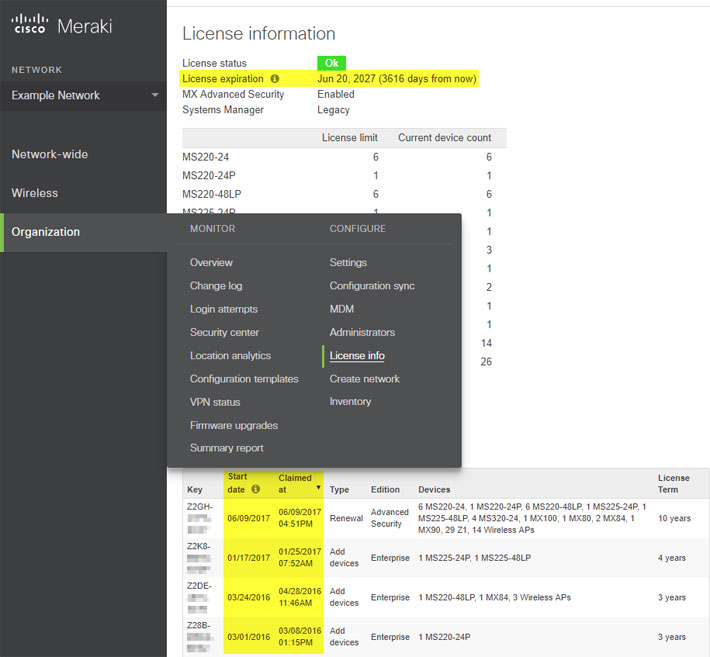



| Product Code: | |
| Options: | |
| Qty: | |
| Unit Price: | £ |

 |
Cisco Meraki Enterprise License for the MS220-8P switch.
Available in 1,3,5,7 and 10 year options
A: Meraki devices use the Meraki cloud for centralised management and control. The Meraki cloud is licensed on a “per device, per year” basis. Each organisation is licensed for a certain number of devices through a termination date.
A: Not necessarily. Licenses are sold separately from the hardware. For example, you could upgrade from the MR16 to the MR24 without buying new licenses. The same will apply for new products that are released in the future.
A: Yes, every Meraki hardware component requires a cloud license to be managed. If you see a warning that says 'Your organisation is in excess of its device limits' on the Meraki Dashboard, this means that you have more devices than licenses in your organisation.
A: The wireless and switch lines have one tier: Enterprise. The MX line has two tiers: Enterprise and Advanced Security.
A: In general, all Meraki products follow the same licensing model. The primary difference between them is that with all wireless access points (MR series) the license is the same for all hardware models, whereas with the switches (MS series) and security appliance line (MX series) each hardware model has a different license. Example: the LIC-ENT-1YR (1 year enterprise MR license) applies to any of the MR access points. The LIC-MS220-24-1YR (1 year enterprise MS220-24 license) applies to the MS220-24 model. The LIC-ENT-MX64-1YR (1 year enterprise MX64 license) applies to the MX64.
A: Advanced Security licensing and features are currently only available on MX devices, not on Z-Series devices, or any other Meraki series of devices.
Note: If the incorrect license key edition was purchased within the past 30 days, the Cisco Meraki team will not upgrade/downgrade the key. The key must be returned and the correct key re-ordered.
Yes, you can purchase and apply an Enterprise renewal key that covers all devices in your organisation; this will revert your organisation to an Enterprise state. You can also contact Meraki Support via phone or email licensing@meraki.com and have your organisation downgraded. Please note that if the organisation is downgraded, you will not receive any additional time from the downgraded license keys.This process is irreversible.
A: A Meraki license includes enterprise-class support.
A: The hardware warranty is tied to the hardware unit, not the license. Hardware that has a lifetime warranty (e.g., the MR24) is warranted for the life of the hardware. Hardware with a fixed term warranty, e.g., 1 year, has a 1 year warranty regardless of the license.
A: Yes you can. Licenses that have been applied to an organisation within the last 7 days can be re-applied to another organisation.
A: Meraki sells 1, 3, 5, 7 and 10 year licenses, but does not sell pro-rated licenses. When you add a license to an existing account, we calculate the amount of extra time in your account and extend the co-terminating renewal date for all your devices accordingly.
Let’s say you originally purchased a 10 AP, 1 year license. 4 months into the license
term you decide to add a 6 AP, 1 year license. You have extra credit of 4*6=24 AP-
months. We automatically apply those 24 AP-months for your new 16 AP network. This
gives you an additional 24 / 16 = 1.5 months.
In this way an account only has a single co-terminating renewal date, avoiding the confusion associated with multiple renewal dates To anticipate how new licenses will affect your co-termination date.
A: The screenshot below shows a customer with all Meraki products. They have applied three different licenses on different dates for 3 different products. There is one expiration date.

A: You can purchase a renewal through Comms Express. If you chose not to renew, you will no longer be able to manage your devices via the Meraki cloud, and your Meraki network devices will cease to function. This means that you will no longer be able to configure or make changes to your Meraki network equipment, and your Meraki network products will no longer allow traffic to pass to the Internet. With Systems Manager networks, you will no longer be able to enroll devices or change settings for currently enrolled devices.
A Cisco Meraki Licensing is co-terminating. This means the end dates for all licensing is averaged together based on device type and licensing limits. In other words, your individual licenses don't expire because they are averaged into one expiration date.
A The recommended practice for applying a renewal is to purchase a single license key that covers every device currently in the Organisation for some number of years. Applying that license key as a renewal will then extend the Organisation’s licensing by that many years.
When a license key is applied as a renewal, the Organisation’s licensing state updates to match the device count of that license key. For example, if an Organisation with licensing for 5 APs were to have a 2-AP license applied as a renewal, that Organisation would only be licensed for 2 APs. In this instance, it would be 3 APs over their license limit, and therefore out-of-compliance.
A: Yes, administrators listed on the account will be sent notifications 30 days prior to account expiration outlining the steps for license extension. A further e-mail will be sent 3 days prior to account expiration. In addition, an account expiration banner will be displayed in the Meraki dashboard during this time.
A: Yes, administrators listed on accounts that have more devices than cloud licenses will be sent notifications 30 days prior to account expiration outlining the steps for license purchase.
A: 'Out of license' is a term that refers to an organisation that is in one of the following two states: (1) Cloud license has expired, or (2) The number of hardware devices exceeds the number of cloud licenses. If an organisation is out of license it means it has been deactivated, and either license renewals or additional licenses are required for the Meraki products to function, and for these products to be manageable using the Meraki cloud.
A: You can reactivate your account at any point in the future after it expires by adding the necessary number of valid licenses. Please note that once your account expires, your products will stop functioning.
Cisco Meraki Enterprise License for the MS220-8P switch.
Available in 1,3,5,7 and 10 year options
A: Meraki devices use the Meraki cloud for centralised management and control. The Meraki cloud is licensed on a “per device, per year” basis. Each organisation is licensed for a certain number of devices through a termination date.
A: Not necessarily. Licenses are sold separately from the hardware. For example, you could upgrade from the MR16 to the MR24 without buying new licenses. The same will apply for new products that are released in the future.
A: Yes, every Meraki hardware component requires a cloud license to be managed. If you see a warning that says 'Your organisation is in excess of its device limits' on the Meraki Dashboard, this means that you have more devices than licenses in your organisation.
A: The wireless and switch lines have one tier: Enterprise. The MX line has two tiers: Enterprise and Advanced Security.
A: In general, all Meraki products follow the same licensing model. The primary difference between them is that with all wireless access points (MR series) the license is the same for all hardware models, whereas with the switches (MS series) and security appliance line (MX series) each hardware model has a different license. Example: the LIC-ENT-1YR (1 year enterprise MR license) applies to any of the MR access points. The LIC-MS220-24-1YR (1 year enterprise MS220-24 license) applies to the MS220-24 model. The LIC-ENT-MX64-1YR (1 year enterprise MX64 license) applies to the MX64.
A: Advanced Security licensing and features are currently only available on MX devices, not on Z-Series devices, or any other Meraki series of devices.
Note: If the incorrect license key edition was purchased within the past 30 days, the Cisco Meraki team will not upgrade/downgrade the key. The key must be returned and the correct key re-ordered.
Yes, you can purchase and apply an Enterprise renewal key that covers all devices in your organisation; this will revert your organisation to an Enterprise state. You can also contact Meraki Support via phone or email licensing@meraki.com and have your organisation downgraded. Please note that if the organisation is downgraded, you will not receive any additional time from the downgraded license keys.This process is irreversible.
A: A Meraki license includes enterprise-class support.
A: The hardware warranty is tied to the hardware unit, not the license. Hardware that has a lifetime warranty (e.g., the MR24) is warranted for the life of the hardware. Hardware with a fixed term warranty, e.g., 1 year, has a 1 year warranty regardless of the license.
A: Yes you can. Licenses that have been applied to an organisation within the last 7 days can be re-applied to another organisation.
A: Meraki sells 1, 3, 5, 7 and 10 year licenses, but does not sell pro-rated licenses. When you add a license to an existing account, we calculate the amount of extra time in your account and extend the co-terminating renewal date for all your devices accordingly.
Let’s say you originally purchased a 10 AP, 1 year license. 4 months into the license
term you decide to add a 6 AP, 1 year license. You have extra credit of 4*6=24 AP-
months. We automatically apply those 24 AP-months for your new 16 AP network. This
gives you an additional 24 / 16 = 1.5 months.
In this way an account only has a single co-terminating renewal date, avoiding the confusion associated with multiple renewal dates To anticipate how new licenses will affect your co-termination date.
A: The screenshot below shows a customer with all Meraki products. They have applied three different licenses on different dates for 3 different products. There is one expiration date.

A: You can purchase a renewal through Comms Express. If you chose not to renew, you will no longer be able to manage your devices via the Meraki cloud, and your Meraki network devices will cease to function. This means that you will no longer be able to configure or make changes to your Meraki network equipment, and your Meraki network products will no longer allow traffic to pass to the Internet. With Systems Manager networks, you will no longer be able to enroll devices or change settings for currently enrolled devices.
A Cisco Meraki Licensing is co-terminating. This means the end dates for all licensing is averaged together based on device type and licensing limits. In other words, your individual licenses don't expire because they are averaged into one expiration date.
A The recommended practice for applying a renewal is to purchase a single license key that covers every device currently in the Organisation for some number of years. Applying that license key as a renewal will then extend the Organisation’s licensing by that many years.
When a license key is applied as a renewal, the Organisation’s licensing state updates to match the device count of that license key. For example, if an Organisation with licensing for 5 APs were to have a 2-AP license applied as a renewal, that Organisation would only be licensed for 2 APs. In this instance, it would be 3 APs over their license limit, and therefore out-of-compliance.
A: Yes, administrators listed on the account will be sent notifications 30 days prior to account expiration outlining the steps for license extension. A further e-mail will be sent 3 days prior to account expiration. In addition, an account expiration banner will be displayed in the Meraki dashboard during this time.
A: Yes, administrators listed on accounts that have more devices than cloud licenses will be sent notifications 30 days prior to account expiration outlining the steps for license purchase.
A: 'Out of license' is a term that refers to an organisation that is in one of the following two states: (1) Cloud license has expired, or (2) The number of hardware devices exceeds the number of cloud licenses. If an organisation is out of license it means it has been deactivated, and either license renewals or additional licenses are required for the Meraki products to function, and for these products to be manageable using the Meraki cloud.
A: You can reactivate your account at any point in the future after it expires by adding the necessary number of valid licenses. Please note that once your account expires, your products will stop functioning.